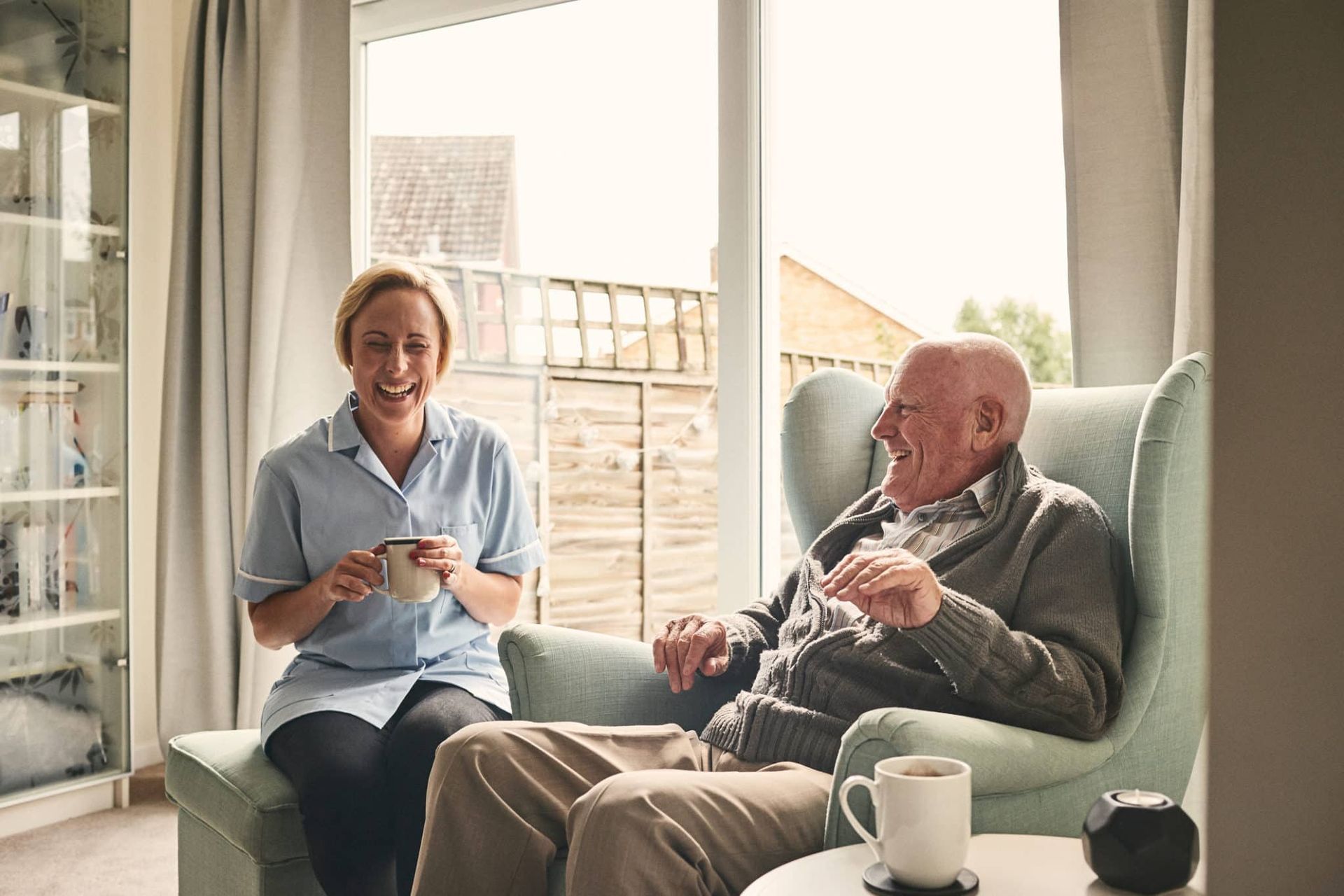The Emotional Benefits of In-Home Care for Seniors and Families
How Compassionate Care at Home Nurtures Well-Being, Independence, and Peace of Mind

Introduction to the Emotional Power of In-Home Care
When families first consider in-home care for a loved one, much of the focus tends to center on practical needs. Tasks like bathing, dressing, housekeeping, meal preparation, and mobility assistance often dominate the conversation. While these physical supports are undeniably essential, there is another equally important, yet often overlooked, dimension of in-home care: the emotional benefits.
Aging brings with it a host of challenges that extend far beyond physical limitations. Feelings of isolation, anxiety about losing independence, grief over lost friends or spouses, and the general uncertainty that can accompany growing older weigh heavily on many seniors. For families, the emotional toll is also profound. Watching a parent or loved one struggle can evoke a complex mixture of worry, guilt, sadness, and helplessness.
In-home care offers a solution that not only addresses practical needs but also supports emotional well-being in powerful, meaningful ways. It enables seniors to remain in their own familiar surroundings while fostering companionship, dignity, and a sense of control over their lives. For families, the reassurance that comes from knowing their loved one is supported both physically and emotionally can be life-changing.
This guide explores the often underappreciated emotional benefits of in-home care. It reveals how compassionate, non-medical support does far more than assist with daily tasks—it nurtures confidence, strengthens family bonds, reduces stress, and ultimately transforms the experience of aging into one that is filled with connection, comfort, and joy.
The Comfort of Familiar Surroundings
For seniors, the ability to remain in their own home is an emotional anchor that cannot be overstated. Home is more than just a place—it is a tapestry of memories, routines, and comfort. Every room tells a story, whether it’s the kitchen where family meals were prepared, the living room where grandchildren played, or the garden that brought decades of quiet joy. This sense of place contributes significantly to emotional stability and overall well-being.
The emotional upheaval associated with moving to an assisted living facility can be daunting. Uprooting one’s life often leads to feelings of confusion, sadness, and even grief. Seniors may feel that they are losing control over their lives, surrendering not just their independence but also their identity tied to the space they call home. These feelings can exacerbate anxiety, depression, and loneliness, especially when the move separates them from familiar neighborhoods, friends, and community ties.
In-home care preserves this vital connection to home. Seniors are able to continue enjoying the routines and environments that bring them peace and happiness. Whether it is sitting in a favorite chair, enjoying the view from a well-loved porch, or tending to a beloved pet, the ability to remain at home fosters a profound sense of comfort and security. This familiarity offers emotional grounding that enhances mental health and overall quality of life.
Caregivers play a crucial role in reinforcing this comfort. Rather than forcing seniors to adapt to a new environment, caregivers adapt to the senior’s world. They work within the rhythms and routines that feel most natural to the client, making the support feel seamless rather than disruptive. This approach ensures that the emotional bond to home remains intact while providing the necessary assistance to maintain independence and safety.
Companionship That Eases Loneliness
Loneliness is one of the most pervasive challenges faced by seniors, especially those who live alone. The loss of a spouse, the passing of lifelong friends, or even reduced mobility that limits outings can lead to extended periods of isolation. This social disconnection is not just emotionally painful—it has been linked to serious health risks, including depression, cognitive decline, and even an increased risk of mortality.
In-home caregivers offer companionship that is as essential as any practical assistance they provide. Having someone to talk to, share stories with, or simply enjoy quiet moments alongside can significantly improve a senior’s emotional state. These daily interactions fill the gaps left by diminished social circles, offering conversation, laughter, and a reassuring presence that combats feelings of isolation.
Caregivers often become trusted companions, developing genuine friendships with the seniors they serve. This bond extends beyond routine tasks. A caregiver learns what brings joy to the client, whether it is listening to music, going for walks, playing a favorite card game, or reminiscing about old memories. These shared experiences create moments of joy and connection that elevate the emotional atmosphere of the senior’s life.
The emotional benefit of companionship also ripples outward to the family. Knowing that their loved one is not spending long days alone brings profound relief to family members who may live far away or have limited time to visit regularly. This assurance reduces feelings of guilt and worry, allowing families to rest easier knowing their loved one has daily emotional support and social engagement.
The Reassurance of Consistent, Caring Support
One of the greatest emotional stressors for both seniors and their families is uncertainty. Without regular support, seniors may worry about how they will handle tasks like preparing meals, remembering medications, or simply getting through the day safely. This uncertainty often leads to heightened anxiety, which in turn affects mood, sleep, and overall health.
Families experience this uncertainty as well. Many adult children find themselves consumed with worry about whether their parent is eating well, staying safe, or feeling lonely. This constant concern can strain relationships, lead to caregiver burnout, and cause emotional fatigue that affects work, family life, and mental health.
In-home care provides a sense of consistency and dependability that dramatically reduces this stress. Knowing that a reliable, compassionate caregiver will arrive on schedule to assist with daily tasks brings comfort not only to the senior but also to the entire family. This predictable routine creates emotional stability and reinforces a sense of safety.
This consistent presence builds trust between the caregiver and the client. Over time, the senior develops confidence in their caregiver’s ability to support them, which in turn alleviates fear about facing the challenges of aging alone. Families likewise benefit from this trust. The peace of mind that comes with knowing their loved one is in capable, caring hands allows them to focus on enjoying their time together rather than being overwhelmed by constant worry.
Preserving Dignity and Independence
Aging can sometimes be accompanied by feelings of frustration or sadness as once-simple tasks become more difficult. For seniors who have spent a lifetime taking care of themselves and others, the prospect of needing help can feel demoralizing. Maintaining dignity and autonomy is often a top emotional priority for older adults, and how help is delivered plays a significant role in how it is received.
In-home care offers a model of support that preserves independence while offering assistance where it is needed most. Rather than being placed in a situation where schedules, meals, and routines are dictated by an institution, seniors retain control over how they live their lives. The caregiver supports their choices rather than imposing new routines. This respect for autonomy is a key driver of emotional well-being.
When help is delivered in a way that honors the senior’s preferences and lifestyle, the emotional benefits are profound. Seniors feel empowered rather than diminished. They continue to make choices about their daily lives, from what they eat to how they spend their time. This sense of agency reinforces self-esteem and reduces the risk of depression that often accompanies feelings of helplessness.
Caregivers also approach personal care tasks, such as bathing and dressing, with sensitivity and respect. Their goal is to assist in ways that feel supportive rather than intrusive. This balance ensures that seniors receive the help they need without compromising the dignity that is so essential to emotional wellness.
Reduced Family Stress and Improved Relationships
The emotional toll of caregiving on family members is often substantial. While caring for a loved one can be rewarding, it is also a source of stress, exhaustion, and sometimes even conflict. Balancing the demands of work, raising children, and managing one’s own life while providing consistent care to an aging parent or relative can feel overwhelming. Over time, this stress can lead to burnout, resentment, or strained relationships within the family.
In-home care provides critical relief that transforms family dynamics. By entrusting daily care tasks to a professional, families are freed from the constant pressure of trying to manage everything themselves. This shift allows family members to return to their primary role as son, daughter, or spouse, focusing on emotional connection rather than being consumed by caregiving duties.
When the logistical stress of caregiving is reduced, family interactions often improve. Visits become centered on quality time, shared conversations, and meaningful experiences rather than the exhaustion that comes from being in a perpetual state of caregiving mode. This emotional reset can restore closeness, strengthen bonds, and create space for joy and connection.
Additionally, the relief that comes from knowing a loved one is being cared for by a trained, compassionate professional reduces anxiety for family members. It replaces the constant mental checklist of tasks and worries with peace of mind, which positively impacts the emotional health of the entire family. This benefit cannot be overstated, particularly for those who live far away or are balancing multiple responsibilities.
Emotional Support for Seniors with Cognitive Challenges
Seniors facing cognitive decline, whether from Alzheimer’s, dementia, or other conditions, experience unique emotional challenges. Confusion, frustration, and fear can accompany memory loss and the gradual erosion of familiar routines. These emotions are often compounded by the sadness of realizing that certain abilities are fading. For families, witnessing this decline is emotionally devastating.
In-home care provides a level of emotional support tailored specifically to the needs of seniors with cognitive impairments. Caregivers who are trained in dementia care understand how to create calm, predictable environments that reduce confusion and anxiety. Their consistent presence and gentle approach help seniors feel secure even as their cognitive abilities change.
Maintaining familiar surroundings is particularly beneficial for those with dementia. Being in their own home, surrounded by objects, furniture, and routines they recognize, can lessen disorientation and improve emotional well-being. Caregivers reinforce this familiarity, providing cues and prompts that help seniors navigate their day with greater ease.
For families, the emotional relief of knowing their loved one is being cared for by someone who understands the complexities of cognitive decline is immeasurable. It reduces the overwhelming fear and helplessness that often accompanies caregiving in these situations and replaces it with a sense of partnership and shared support.
The Joy of Meaningful Daily Moments
In-home care is not just about completing tasks; it is about creating moments that bring joy, laughter, and meaning to daily life. Small gestures like sharing a cup of coffee, tending to a garden, listening to favorite songs, or reminiscing about the past hold enormous emotional value for seniors.
These meaningful moments contribute significantly to a senior’s sense of well-being. They break up the monotony of the day, provide opportunities for connection, and reinforce that life still holds enjoyment and purpose. The caregiver’s presence transforms the ordinary into the meaningful, helping seniors rediscover simple pleasures that may have been lost amidst the challenges of aging.
Caregivers often become witnesses to a senior’s life story, providing a listening ear that honors their experiences, memories, and wisdom. This validation of one’s life history is incredibly powerful emotionally. It acknowledges the senior’s journey, creating a space where they feel seen, heard, and valued.
For families, knowing that their loved one is experiencing daily joy rather than mere survival brings profound emotional comfort. It reframes the experience of aging from one of decline to one of continued growth, connection, and fulfillment.
Emotional Well-Being Through Compassionate Care
The emotional benefits of in-home care for seniors and their families are as vital as the practical assistance it provides. It preserves dignity, fosters companionship, and creates a sense of security that supports both mental and emotional health. For seniors, it means remaining in the home they love, surrounded by familiar comforts and empowered to live life on their own terms.
For families, in-home care transforms worry and exhaustion into peace of mind and restored relationships. It replaces the constant stress of caregiving with the reassurance that a compassionate professional is providing the daily support their loved one needs. This relief strengthens family bonds and allows everyone involved to focus on connection, love, and shared moments of joy.
At Caring Solutions In Home Care, we believe that the heart of caregiving is emotional care. Our mission is to enrich the lives of seniors by providing not just assistance, but companionship, dignity, and comfort. In-home care is more than a service—it is a partnership in nurturing well-being, independence, and the emotional richness that makes life meaningful.







